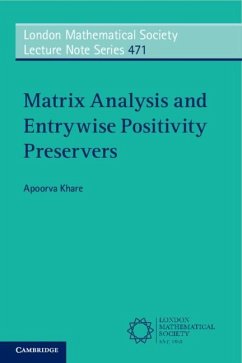Matrices and kernels with positivity structures, and the question of entrywise functions preserving them, have been studied throughout the 20th century, attracting recent interest in connection to high-dimensional covariance estimation. This is the first book to systematically develop the theoretical foundations of the entrywise calculus, focusing on entrywise operations - or transforms - of matrices and kernels with additional structure, which preserve positive semidefiniteness. Designed as an introduction for students, it presents an in-depth and comprehensive view of the subject, from early results to recent progress. Topics include: structural results about, and classifying the preservers of positive semidefiniteness and other Loewner properties (monotonicity, convexity, super-additivity); historical connections to metric geometry; classical connections to moment problems; and recent connections to combinatorics and Schur polynomials. Based on the author's course, the book is structured for use as lecture notes, including exercises for students, yet can also function as a comprehensive reference text for experts.
Dieser Download kann aus rechtlichen Gründen nur mit Rechnungsadresse in A, B, BG, CY, CZ, D, DK, EW, E, FIN, F, GR, HR, H, IRL, I, LT, L, LR, M, NL, PL, P, R, S, SLO, SK ausgeliefert werden.


